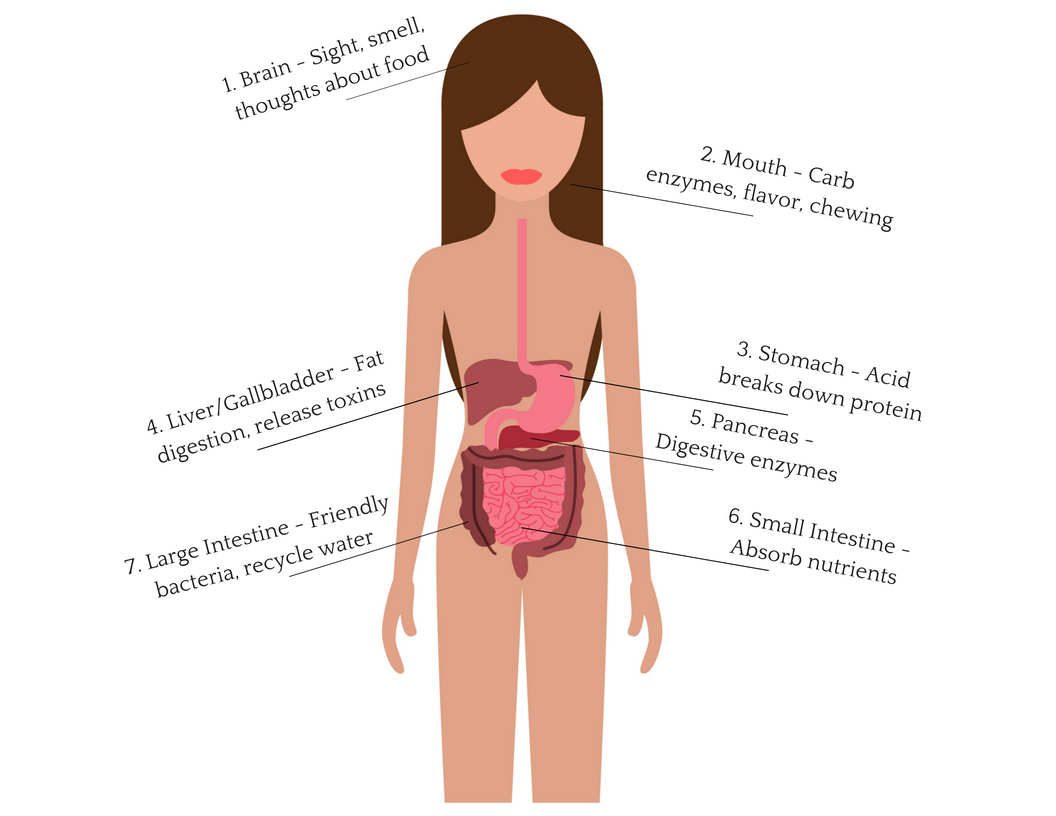How your Digestion Actually Works
Make Friends with your Digestion!
This article is Part 2 of the digestion series:
The goal of digestion is to take a solid food and break it down into its individual molecular components.
It takes a lot of digestive fire to make this happen!
Your digestive system is hard at work every single day. How well do you know this part of your body? If you’ve ever struggled with bloating, stomach cramps, gas, or unpleasant trips to the bathroom, it’s high time you make friends with the seven MVPs of your digestive system!
1. Your Brain
Your brain is like the sentry in a watch tower. As soon as you see, smell, or even THINK about food, your brain is on the megaphone telling everyone down south to get ready for a tasty meal! Your mouth starts to salivate and your stomach starts producing acid. These are vital first steps to healthy digestion. They prime your system. And just like when you're painting furniture, it may be tempting to skip the primer, but you always end up with a better result when you take the time to do things right!
2. Your Mouth
Spit isn’t just for licking stamps! Your saliva glands produce an amazing, complex liquid filled with digestive enzymes. These enzymes start breaking down carbohydrates before they even make it to the stomach! And don’t forget to chew! Your body can’t make up for poorly chewed food later on. Your body needs the mechanical action of chewing to happen first.
3. Stomach
Stomach acid is your friend! You might be thinking, “gee, I’ve seen a LOT of commercials telling me stomach acid is causing all my problems, are you sure about this?” and YES! stomach acid is a vital part of good digestion. Without it you cannot digest proteins and you are very likely to develop an overgrowth of unfriendly bacteria farther south. Stomach acid is the barrier between the unfriendly outside bugs and the beneficial inside bugs. Plus, insufficient acids means that food sits in your stomach for way too long and can start to ferment. This is NOT the good kind of fermentation.
4. Liver & Gallbladder
This dynamic duo is responsible for digesting your fats. The liver creates bile and stores it inside the gallbladder. There are lot of dominos that need to be tipped over in order for your gallbladder to put the bile into the small intestine. You need the right level of stomach acid and you need a good dose of fat in your meal. The bile emulsifies the fat so that it mixes with the rest of your food and can be absorbed farther south.
5. The Pancreas
Your pancreas is responsible for making digestive enzymes to help further break down any carbohydrates that didn’t get processed in your saliva, plus enzymes to continue breaking down proteins and fats. Your pancreas can put out an impressive 8 cups of enzyme rich fluid in a single day! The pancreas is also responsible for producing bicarbonate (think baking soda) to neutralize your food's pH after going through the stomach's acid bath.
6. Small intestines
By this point your food has been thoroughly pulled apart and should be nothing more than soup filled with amino acids, vitamins, minerals, chains of carbohydrates, and fatty acids. This 5 foot long tube is wallpapered with tiny fingers called villi. Like tall grass waving in a breeze the villi reach into this nutritious soup and pull the nutrients into your blood stream. It's very improtant to keep your villi long and healthy!
7. Large intestine
After your small intestine has pulled out all the good stuff from your food, the beneficial bacteria in your large intestine go to work digesting the insoluble fiber, and converting a few difficult to digest nutrients into a more usable form. Your large intestine also recycles water. Bet you didn’t know you were so eco friendly!

